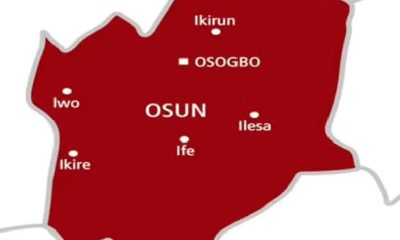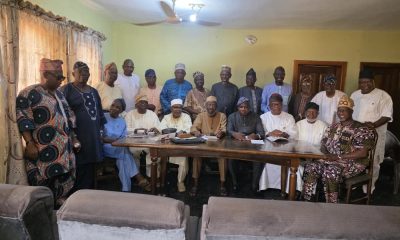News
Facts of History: The economics of corruption in Nigeria Judiciary

By Ajibola Olaniyi
The Nigerian public attention in the past days has been tailored towards the most sensitive arm of the government; the judiciary.
The recent arrests of judges by the DSS, on the allegation of corruption and bribery has been at the front burner of public discourse, as different schools of thoughts continued to critic the scope, legality, and morality of the arrests.
Some have justified the arrests on the premise of defending and protecting the national security and tranquility, saying an attempt to compromise the judiciary to the level of supreme court portends a serious threat to the national security, and indivisibility of our nation-state.
Meanwhile, array of “egalitarians” and legal minds have argued that the modus operandi of the arrests was tantamount to a war against the judiciary and a dangerous affront on the temple of justice.
They further resorted that the arrests were carried out in error, adding that allegations of bribery and corruption against judges should have been reported to the National Judicial Council, the body saddled with the responsibility of regulating the activities of men on the bench.
While this lasted, I continued to ruminate on the factors that could have deteriorated our national values so badly to the point where the teeth of mother of justice in the land is being x-rayed to be artificial, and deceptive.
The phobia of the likely collapse of the whole building of our entity, in the face of weaken and falling institutional pillars prompted me to dig deep into the foundation of the judiciary in Nigeria, to see if there was no foundational error on the erection of the pillars that hold our building.
Alas! I discovered the most damning revelation of my life, the unbelievable but facts of history of the apex court in Nigeria, the economics of corruption that necessitated the establishment of Supreme Court in Nigeria, and the unresolved anomaly at the inner temple of justice.
In the course of my interactions with living encyclopedia and erudite scholar, James Arinloye, an Ijesha Prince, I discovered that the desperacy for black market justice informed the idea of Supreme Court in Nigeria.
It all started at the tail end of the first republic, when Chief Samuel Ladoke Akintola refused to surrender the ring and gown of marriage he had with the Action Group(AG) after a celebrated divorce as a result of vote of no confidence passed on him as the Premier of the Western Region.
Akintola, a new wife in the comfort home of the ruling party and with a new name of NNDP called the bluff of the AG, and rather undauntedly told them that the ring and gown(Premiership) remained his, and not negotiable in any way.(Ati toje boloosa lowo, oku baba eni ti o bo.)
The AG had no choice at that point than to approach the court for adjudication. While the court of first instance favoured Akintola, the appellate court set aside the ruling of the lower court and upheld the vote of no confidence passed on him by his former party, ordered him to vacate his seat as the premier.
Struggling with this legal blow, the late premier approached the Privy Council of London, being the highest court for Nigeria before independence and in the post-independence era, but unfortunately for Ajala Akintola baba lamilami, the Privy Council upheld the ruling of the appellate court and instructed him to leave the corridor of power quickly.
Tafawa Balewa led Federal Government was left with no other option than to protect the beautiful wife of the administration, and create a soft landing for him.
In a swift turn, the government of that day established an indigenous apex court for Nigeria, coined “Supreme Court”.
The first case to be entertained by the apex court was Akintola v Adegbenro, (Adegbenro was an AG candidate that was positioned to become the Premier after Akintola) in which the court set aside the two rulings against Akintola and pronounced him the substantive Premier of the Western Region.
Obviously, by the simple economic principles of demand and supply, the trend of demand determines the frequency of supply in the short run, and as the demand increases, the supply continues to swell as a response to increased demand, all things being equal. So, it would turn out to be “the higher the demand, the higher the supply in the long run.
In other worlds, supply naturally respond to demand, and not the other way rounds, meaning that demand is the determinant factor in the microeconomic logic of supply-demand chain. Of course, it is only rational for supplier of goods and services to jack up his supplies when quantity demanded for his goods increases, to earn more.
In the same vein, the demand for cheap and black market justice by the political class made the unscrupulous ones among the men on the bench to pervert the course of natural justice and opted for artificial justice for fees, and on demand. It is indeed a nagging generational and foundational error in the judiciary, that require urgent and proactive attention and rectification by all possible means, if and if we see the need for the continuity of our corporate entity.
-

 Opinion4 days ago
Opinion4 days agoThe Clout-chasing Dipo Awojide By Comrade Da’Peace
-

 News3 days ago
News3 days agoRamadan, Lent: Shettima Calls For National Unity And Compassion
-

 Opinion3 days ago
Opinion3 days agoReinventing Osun’s Economy Through Dagbolu Intl. Trade Centre: From Quiet Market Lessons To Regional Trade Revolution By Adeboye Adebayo
-

 News5 days ago
News5 days ago2026: Let’s Work Hand In Hand To Ensure Party’s Victory, APC Igbimo-Agba Osun Urges Ex-guber Aspirants, Party Members



